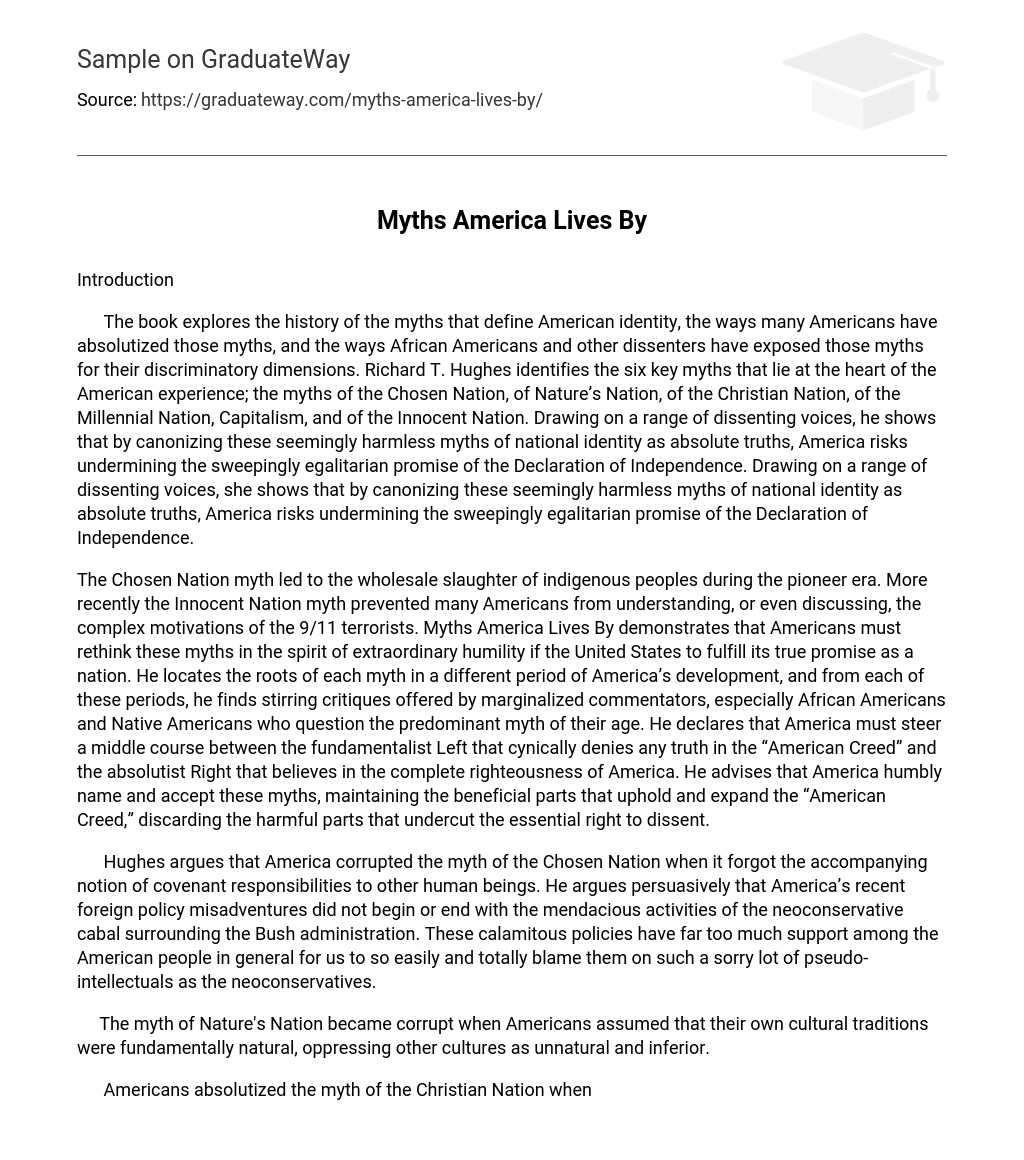Introduction
The book explores the history of the myths that define American identity, the ways many Americans have absolutized those myths, and the ways African Americans and other dissenters have exposed those myths for their discriminatory dimensions. Richard T. Hughes identifies the six key myths that lie at the heart of the American experience; the myths of the Chosen Nation, of Nature’s Nation, of the Christian Nation, of the Millennial Nation, Capitalism, and of the Innocent Nation. Drawing on a range of dissenting voices, he shows that by canonizing these seemingly harmless myths of national identity as absolute truths, America risks undermining the sweepingly egalitarian promise of the Declaration of Independence. Drawing on a range of dissenting voices, she shows that by canonizing these seemingly harmless myths of national identity as absolute truths, America risks undermining the sweepingly egalitarian promise of the Declaration of Independence.
The Chosen Nation myth led to the wholesale slaughter of indigenous peoples during the pioneer era. More recently the Innocent Nation myth prevented many Americans from understanding, or even discussing, the complex motivations of the 9/11 terrorists. Myths America Lives By demonstrates that Americans must rethink these myths in the spirit of extraordinary humility if the United States to fulfill its true promise as a nation. He locates the roots of each myth in a different period of America’s development, and from each of these periods, he finds stirring critiques offered by marginalized commentators, especially African Americans and Native Americans who question the predominant myth of their age. He declares that America must steer a middle course between the fundamentalist Left that cynically denies any truth in the “American Creed” and the absolutist Right that believes in the complete righteousness of America. He advises that America humbly name and accept these myths, maintaining the beneficial parts that uphold and expand the “American Creed,” discarding the harmful parts that undercut the essential right to dissent.
Hughes argues that America corrupted the myth of the Chosen Nation when it forgot the accompanying notion of covenant responsibilities to other human beings. He argues persuasively that America’s recent foreign policy misadventures did not begin or end with the mendacious activities of the neoconservative cabal surrounding the Bush administration. These calamitous policies have far too much support among the American people in general for us to so easily and totally blame them on such a sorry lot of pseudo-intellectuals as the neoconservatives.
The myth of Nature’s Nation became corrupt when Americans assumed that their own cultural traditions were fundamentally natural, oppressing other cultures as unnatural and inferior.
Americans absolutized the myth of the Christian Nation when they tried to Americanize Christianity, creating an explicitly Christian nation and excluding other American religious voices. Hughes says at the outset that his primary goal is to open up our understanding of U.S. civil religion to voices that were previously marginalized. He allows African-American voices, both male and female, to stand for all the marginalized groups.
The myth of the Millennial Nation is one that describes the vision and perception held by the American people that suggests that the United States is the Nation responsible for heralding in the second coming of Jesus Christ. Hughes ties this vision to the American idea of manifest destiny which held much responsibility for our nation’s growth and overpowering force, not merely in our hemisphere.
Finally, Hughes contends that the myth of the Innocent Nation is wholly false and without redemptive value. He draws on both historical and modern primary sources to show how Americans absolutize the myths, and he uses dissenting African-American and Native-American voices to demonstrate the destructive effects of the myths’ corruption.
Conclusion
Hughes restates this question as one that all of us must face, Christian and non-Christian alike. Yet he never answers or really grapples with the question. He merely restates Bellah’s claim that empire has been thrust upon us. If empire has been thrust upon us by some world-historical process (and perhaps by God), then we must become a responsible empire. Standing against empire would be futile (and perhaps ungodly). Hughes’ strength lies in the fact that his criticism of the myths does not lead him to discard the myths entirely. He accurately distinguishes between the good and the corrupt forms of the myths. His weakness lies in the fact that he often fails to notice that the myths have been redeemed from their corruption, and often by the good forms of the myths themselves. For instance, he fails to explore adequately the cultural forces that led to the end of slavery and manifest destiny, which seems relevant given his interest in embracing the higher and nobler forms of the myths. Hughes’ use of dissenting voices also tends to be somewhat narrow, and he often fails to acknowledge dissenting voices that do not fit his paradigm of “the poor, the disenfranchised, and the dispossessed” African-American.
References.
Richard T. Hughes. Myths America Lives By, (2004).





